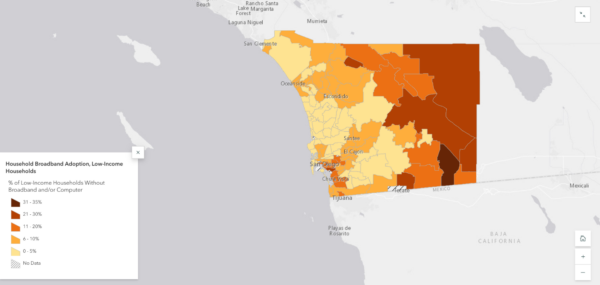
By Macy Meinhardt, Voice & Viewpoint Staff Writer
People rely on the internet to do almost everything. Making a doctor’s appointment, paying a bill, applying for a job, turning in a homework assignment and more. Experts claim accessible internet access is a civil right in today’s age, bearing the responsibility to ensure it is a tool in reach for everyone.
“Access to reliable broadband is no longer a luxury; it’s a necessity for education, employment, healthcare, and daily life,” said Mustafa Sahid, Somali Family Service Director of Operations.
A staggering 53,000 households in the City of San Diego lack internet access based on reports from 2022. These gaps were largely exposed during the pandemic, when many societal activities were forced online.
Known as the digital divide, since 2021, many shareholders and government leaders have been working on efforts to bridge the affordability gap through digital equity initiatives.
The goal for digital equity is for everyone— regardless of socioeconomic or geographical status— to have equal access to information and internet resources. The City of San Diego is a leading entity in this, labeled as the number one “Digital City” by the editorial staff at Gov Tech Today.
Recently, the city’s Information and Technology Department unveiled its newest Broadband Master Plan, an effort to gain analysis and make recommendations to target internet speed, access, and affordability around the city, known as broadband. It is funded by a $500,000 State of California Local Agency Technical Assistance Grant.
A Glance at San Diego’s Digital Landscape
Lack of a computer and internet subscriptions disproportionately affects low-income households, seniors and minority populations, according to an analysis of U.S. Census Bureau American Community Survey data. The 2021 study highlights this disparity in areas including City Heights, Logan Heights, Lemon Grove, and Encanto. For rural and tribal communities in San Diego, lack of internet infrastructure leaves residents with less options, often having to pay higher costs for less quality service, compared to the rest of the city.

Areas in darker shades of orange represent zipcodes that have percentages in which 10-40% of households do not have broadband access or a computer. PHOTO: SANDAG
“It’s important that all San Diegans and San Diego communities have reliable and affordable access to the internet,” said Jonathan Behnke, Chief Information Officer for the City’s Department of IT. “With the Broadband Master Plan initiative, we look forward to learning how to better serve San Diego and eliminate the digital equity divide.”
The move also comes after funding expired for hundreds of thousands of San Diegans relying on internet subsidies from the Biden-Harris administration’s Affordable Connectivity Program (ACP). The program provided low-income residents $30 off their internet bill each month, and also provided a $100 voucher towards a laptop or computer purchase.
The program initiated during the pandemic, ran from from 2021 to mid 2024. It is estimated over 200,000 residents in San Diego County relied on it, based on ACP tracker data from 2024.
The Master Plan will help the City of San Diego work with state and federal programs to improve broadband access. Broadband refers to high-speed internet that allows people to use online services like streaming, video calls, and downloads quickly and reliably. The plan will also explore how the City can use its resources to expand internet access and make it more affordable for everyone.
San Diego’s current digital equity initiative, known as SD Access 4 All, provides wifi at over 300 locations across the city and also provides free and low-cost computer and wifi hot spot check outs for residents at local libraries.
In the coming weeks, a series of focus groups will be conducted to collect feedback and help define the City’s guiding principles for internet access. Residents are invited to participate by completing an internet speed test and an internet access survey, contributing valuable insights into the current state of connectivity.


